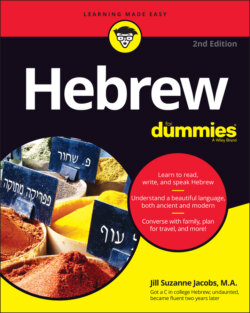Читать книгу Hebrew For Dummies - Jill Suzanne Jacobs - Страница 45
Applying adjectives
ОглавлениеIn Hebrew, the noun comes first, followed by the adjective, which is the opposite of English. So, for example, you say יַלְדָּה הוֹבָה (yahl-dah toh-vah; girl good), meaning “good girl.” You also need to know that adjectives need to match the nouns they modify, both in gender and in number. Table 2-7 lists some common adjectives. For more on number and gender, see the section “Understanding Gender and Number” later in this chapter.
TABLE 2-7 Exploring Some Common Adjectives
| Hebrew | Pronunciation | Translation |
|---|---|---|
| הוֹב | tohv | good (MS) |
| הוֹבָה | toh-vah | good (FS) |
| הוֹבִים | toh-veem | good (MP) |
| הוֹבוֹת | toh-voht | good (FP) |
| רַע | rah | bad (MS) |
| רָעָה | rah-ah | bad (FS) |
| רָעִים | rah-eem | bad (MP) |
| רָעוֹת | rah-oht | bad (FP) |
| גָּדוֹל | gah-dohl | big (MS) |
| גְּדוֹלָה | guh-doh-lah | big (FS) |
| גְּדוֹלִים | guh-doh-eem | big (MP) |
| גְּדוֹלוֹת | guh-dohloht | big (FP) |
| קָהָן | kah-tahn | small (MS) |
| קְהַנָה | kuh-tah-nah | small (FS) |
| קְהָנִים | kuh-tah-neem | small (MP) |
| קְהָנוֹת | kuh-tah-noht | small (FP) |
| מָהִיר | mah-heer | quick (MS) |
| מְהִירָה | muh-hee-rah | quick (FS) |
| מְהִירִים | muh-hee-reem | quick (MP) |
| רוֹת | muh-hee-roht | quick (FP) |
| אִהַּי | ee-tee | slow (MS) |
| אִהַּי | ee-teet | slow (FS) |
| אִהִּיִּים | ee- tee-yeem | slow (MP) |
| אִהִּיּוֹת | ee-tee-ee-yoht | slow (FP) |
In addition, use this adjective pattern: Add an י (ee) ending to change a noun into an adjective. אָבִיב (ah-veev) is “spring” (the season), (ah-vee-vee) is “springlike,” יַלְדוּת (yahl-doot) is “childhood,” and יַלְדוּתִי (yahl-doo-tee) is “juvenile.” Cool, huh?
